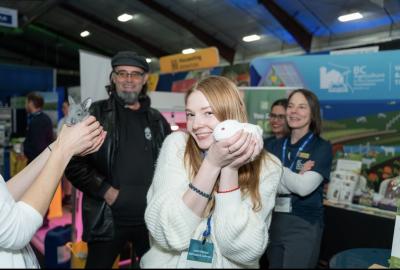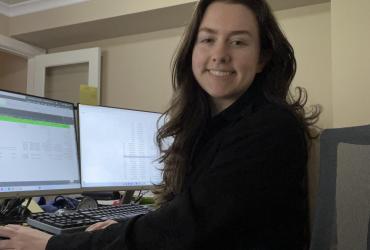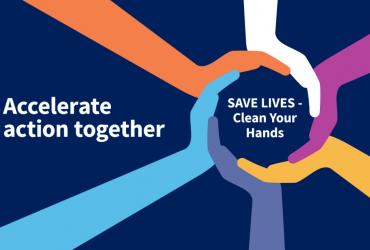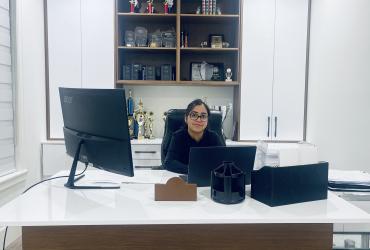Orientation and First Weeks
At first, working in government wasn’t easy. There were so many acronyms, several different branches, and a lot of staff in various positions. On the first day, my supervisor explained everything to me clearly providing me with a work plan for the next 4 months, a list of all the branches and units in the ministry, and a copy of the minister of agriculture’s mandate letter which we reviewed together. I learned how my position as a Youth Development assistant reflected the mandate and the importance of always aligning my work with the mandate. The next few weeks consisted of several general introductory meetings. I had coffee chats with supervisors of different units, met with other co-op students, and even joined other team meetings to observe their workflow. During those meetings, I realized that there's often a lot of back and forth in government work. Teams frequently have to adapt, whether it's because something didn't go as planned and they need to change direction, or due to sudden changes like new fund announcements or budget cuts. Part of my training included taking mandatory government courses where I learned about fraud and prevention, capacity in Indigenous relations, WHIMS, Information management, and so much more. These courses were intense but highly effective. They quickly gave me insight into what it's like to work within a government structure. Since my job works closely with 4-H, a youth organization, I took youth safety courses and training which allowed me to develop the foundation of skills needed for tasks in the future of my co-op. During the first few weeks even though I was doing a lot of training, I had autonomy in what I was learning and even took a few extra government courses such as taking briefing notes, and diversity and inclusion in the workplace.
Learning and Adaptation
When I started my role as a Youth Development assistant, I knew little about 4-H. 4-H is a Youth leadership organization that has more than 100 years of roots. It is much more than an agriculture organization. Participants learn public speaking, problem-solving, teamwork, and so much more. To this day, I am still learning about 4-H and it’s been challenging to adapt and understand everything that this amazing program has to offer. Another learning curve was my writing. Coming from academia my writing tends to be detailed and intricate. For my audience of parents, youth, and colleagues, it wasn’t the appropriate writing style. In this role, I've learned to streamline my writing, moving from the detailed style I used for academic papers to a more concise, yet still professional, approach. Another adjustment I've made is using my breaks more effectively. In my job, most of the time, you are sitting down at your desk. During lunches, I would continue to just sit at my desk however, it left me more tired and less motivated. As time went on, I forced myself to take my breaks, to go on walks, and to not eat lunch at my desk. Because of that, forcing myself to get up, I met a lot of different people around my office and made new connections and friends.
Accomplishments and Challenges
Throughout my term, one of my greatest accomplishments was also my biggest challenge. I delivered a workshop at the national 4-H leadership summit on the topic of integrating climate awareness in your 4-H clubs. The most challenging part in creating this workshop was organizing it. It was a 90-minute session with a diverse age group, so I was not exactly sure how to have an interactive but educational workshop, especially since I was so new to the 4-H scene. Even creating the layout of the workshop was harder than I imagined as I was not exactly sure how long it would take for me to cover each section. To address this, I sought a lot of advice and feedback. I had several meetings with coworkers where we reviewed my plan, slides, and speech, making changes and adaptations to ensure a smoother flow. Throughout the process, I developed key skills such as organizing, problem-solving, and time management. On the day of the workshop, I was so nervous. I didn't have much public speaking experience, especially to a crowd of this magnitude and at an event of this size. In the end, the workshop went well. I had an amazing audience; people were interactive and listening. However, my workshop didn’t go perfectly; There is so much that I could have done better such as more engaging activities, going into further detail, and working on my stage presence instead of focusing as much on a script.
Throughout the term, I also accomplished working on resources such as debate packages rooted in agriculture themes which required skills such as attention to detail, critical thinking, and problem-solving. When creating those packages, it took a lot of pivoting and changing the structure multiple times but the end product was something that ended up being useful to many.
Cultural and Environmental Observations
Working at the Ministry of Agriculture in Abbotsford has been amazing. I've discovered that most people are open to chatting if you just reach out. I've had conversations with many amazing individuals and learned about their career paths and journeys. In the office staff always say hello or gather in common areas for lunch and chat with you. They are also supportive of any personal accommodation that is needed. Whenever I need space whether it may be for mental or religious obligations, I know I’m more than welcome to use any spare room or space. Not only to just use it but to also feel safe in it. One of my favourite things about working at my job is the kindness and the willingness that people have to learn about your cultural identity. It has been amazing meeting so many new people and has made my co-op experience even more rewarding.














